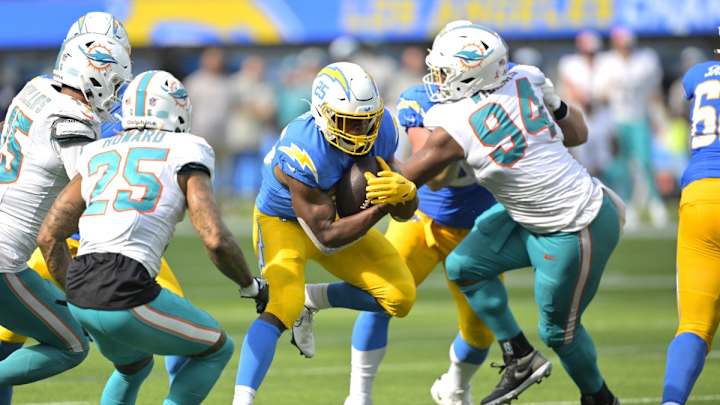Kelly: Miami's Run Defense Experiencing Growing Pains?

The Miami Dolphins escaped Los Angeles with a 36-34 victory over the Chargers because the offense exploded with 536 yards.
Quarterback Tua Tagovailoa was named the AFC’s Offensive Player of the Week because of the clinic he put on in the passing game, but there was another display of mastery showcased during the win Sunday and, unfortunately for the Dolphins, Miami's defense was on the victim end of that offensive showcase.
The Chargers ran for an eye-opening, and league-leading, 233 yards and three touchdowns in what was a surprisingly disappointing performance for a defense that ranked fourth in the NFL against the run last season.
While it’s important to point out that the defense sealed the win by forcing an international grounding penalty and sacking Chargers quarterback Justin Herbert twice on the final drive, which ended with Justin Bethel and Jaelan Phillips recording a sack on fourth-and-12 from the Chargers’ 33-yard line, the Dolphins defenders realize they can’t survive a season with this level of run defense leakage.
"We all know that wasn't our standard," defensive tackle Christian Wilkins said a day after finishing the season opener with three tackles in 68 snaps. "We've got to play better defense. As a leader of the defense, it starts with me.”
Dolphins technique was problematic
Head coach Mike McDaniel explained the problem by insinuating the defense wasn’t playing in harmony, and lacked the technique and fundamentals needed to perform like the stingy front they were last season when they held opponents to 103 rushing yards per game.
Whether that was a byproduct of first-game jitters or growing pains from a unit learning a new scheme is unknown.
“It’s humanity,” McDaniel said. “If you’re able to worry completely about what you can control, and only that, it’s amazing what individuals can do.”
McDaniel is referring to being on one accord, playing assignment football.
“It’s about discipline and technique,” edge defender Jaelan Phillips said. “Obviously these were our first live bullets in a full game with a new defense, so there’s going to be growing pains. It’s about getting back to the drawing board and being disciplined about run fits and things like that.”
Where was David Long?
Inside linebacker David Long hypothesized that players are getting adjusted to a new defense being implemented by grizzled defensive coordinator Vic Fangio.
That’s why Long is confident that the Dolphins will work their way up from the bottom of the rankings in the coming weeks.
“Look to your left and right and we have dogs all across the board. We need to hold ourselves to a better standard,” said Long, who landed a two-year, $10 million deal as one of Miami’s top free agent acquisitions. “We took that initiative today in practice. Everyone was playing fast. We got that first game out of the way and need to capitalize.”
Since the first week of training camp, Fangio has hinted he’s not seeing the consistency he’d like to see from Long, and to everyone’s surprise it was veteran linebacker Andrew Van Ginkel who handled the bulk of the snaps as the inside linebacker paired with Jerome Baker against the Chargers.
Long played 17 defensive snaps, while Van Ginkel, an outside linebacker Miami cross-trained to play inside this offseason, handled 51.
Will that snap count disparity change in Week 2? Was it opponent-specific, or has Long been leapfrogged on the depth chart?
“I’m comfortable with the defense,” Long said. “As far as being in and coming out [of the game], that’s a little different. I’m just listening to what’s being asked of me and doing what’s asked of me.”
The Dolphins face New England on road Sunday night, and even though the Patriots were held to 76 yards on the ground in their season-opening loss against the Eagles, Bill Belichick's teams annually have leaned on the rushing attack, going all the way back to the Tom Brady dynasty era.
Last year the Patriots averaged 106.6 rushing yards per game, which was 15 yards below the NFL average of 121.6 rushing yards.
"Just naturally, there’s obviously a little bit of adjusting," Wilkins said. "We’re all professionals, so we all have to do our job regardless of how plays are being called, what’s being called. If there is a good play called, we’ve got to execute it. If there’s a bad play called, we still have to execute.”
